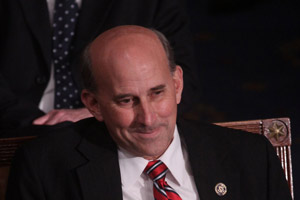Here in the United States of Fear, official voices are again rising in a remarkable crescendo of hysteria.
My advice: don’t even try getting on the subway car filled with American politicians and their acolytes accusing WikiLeaks and Julian Assange of terrorist activity. It’s already standing room only. Among those who have recently spoken out: Senate Republican Leader Mitch McConnell (“I think the man is a high-tech terrorist”); former speaker of the House and possible 2012 presidential candidate Newt Gingrich (“information terrorism… [Assange] should be treated as an enemy combatant”); Republican Congressman Peter King, the next head of the House Homeland Security Committee (“…asked the Obama administration today to ‘determine whether WikiLeaks could be designated a foreign terrorist organization'”); former Republican Senator and possible 2012 presidential candidate Rick Santorum (“We haven’t gone after this guy, we haven’t tried to prosecute him, we haven’t gotten our allies to go out and lock this guy up and bring him up on terrorism charges, because what he’s doing is terrorism, in my opinion.”); Fox News host, Iran-Contra figure, and bestselling author Oliver North (“This is an act of terrorism. It’s information terrorism instead of a bomb going off in Times Square, but it’s still terrorism.”)
And that’s just to skim the (s)cream off the top of the terror accusations boiling out of this Congress and Republican presidential ranks. It’s quite a brew, especially when you add in senators like Joe Lieberman and Diane Feinstein calling for Assange to be prosecuted under the Espionage Act of 1917 and figures like Sarah Palin calling for him to simply be taken out as a terrorist, pure and simple (“Why was he not pursued with the same urgency we pursue al Qaeda and Taliban leaders?”)
Here, however, is a small catch. If this is “terrorism,” a question arises (or at least should arise): Who has been terrorized? Who exactly has been terrified by the recent WikiLeaks releases of, so far, more than 1,000 State Department documents, some going back decades? The answer, I think, is clear enough—not the American people, but the Washington elite who have, in these last years, put in place a version of secrecy so wide-ranging that most of the government’s significant operations abroad (and many at home) have been cast into the shadows beyond the sightlines of the voters in this supposed democracy.
Within the penumbra of spreading secrecy, that elite, sometimes aided and abetted by the mainstream media, has acted with remarkable impunity in invading other countries, kidnapping“suspects” off the streets of global cities, secretly imprisoning under catch-all categories, and torturing, abusing, or even murdering those believed to be terrorists, or at least opposed to Washington’s desires. At the same time, they have been moving to lock down this country in ever more severe (and expensive) ways. So for them, it may indeed feel like a genuinely terrifying experience to see any aspect of that secrecy removed, to discover yet again that what they thought they controlled was not really theirs to control.
And don’t think it’s just a matter of Julian Assange or WikiLeaks in the gun sights either. The Espionage Act of 1917, under which Assange may be charged, was a classic suppressive response to antiwar opposition during World War I. It remains dangerous. Prosecuting Assange under it or any other terror statute would indeed prove an ominous development. It would have—and I’m not one for throwing around totalitarian analogies—a distinctly Soviet feel to it.
Julian Assange may be the one they are coming after right now, but he’s unlikely to prove the end of it. After all, if you’re the next one to give them a fright, you, too, could be declared a terrorist or an enemy combatant (even if you do work for the New York Times). TomDispatch regular Stephan Salisbury, author of Mohamed’s Ghosts: An American Story of Love and Fear in the Homeland, has for some years been reporting on the way “terror” has entered the American bloodstream. Let him tell you what’s in store for 2011.















